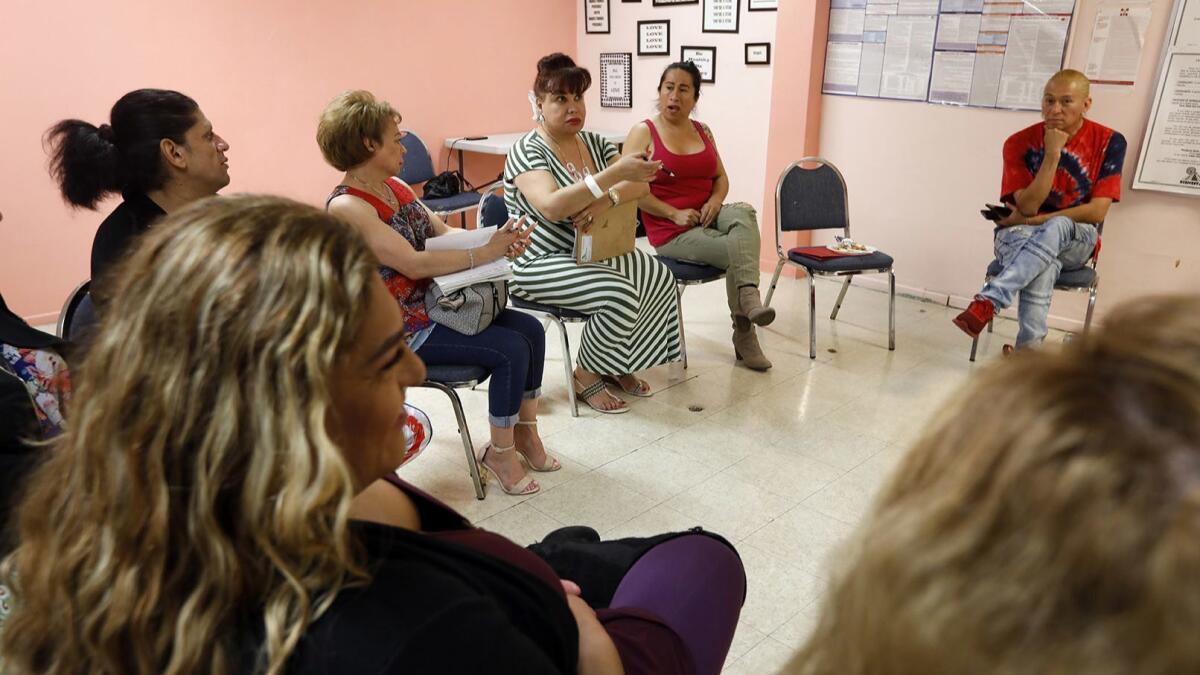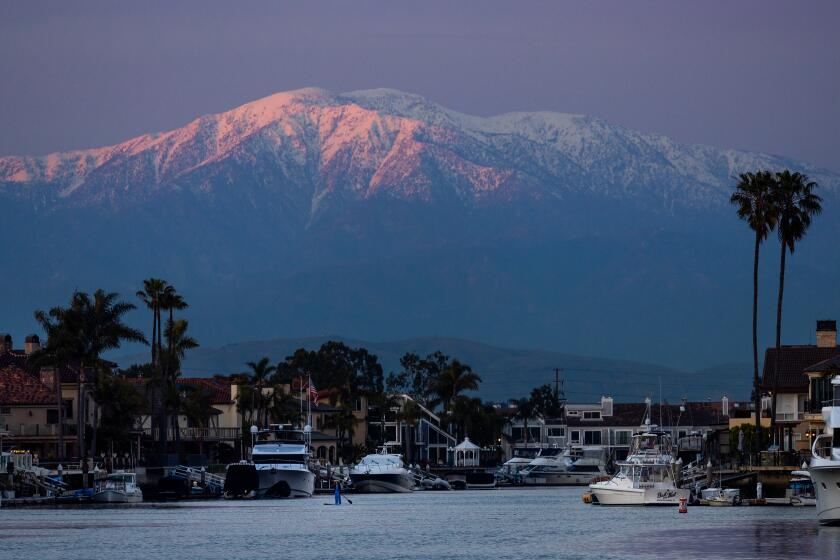Newsletter: Essential California: The biggest challenges facing workers in the state

Good morning, and welcome to the Essential California newsletter. It’s Thursday, May 2, and I’m writing from Los Angeles.
Workers and labor activists rallied around the globe yesterday to mark May Day. In California, demonstrations were held from San Jose to San Diego, and many points in between. In Los Angeles, thousands gathered in MacArthur Park before marching to downtown’s City Hall.
I spoke to Los Angeles Times labor and economy reporter Margot Rooseveltabout some of the challenges facing California workers, and why they matter.
What’s the biggest issue facing California workers right now?
I think being able to afford to live in California is the biggest. Nationally, wages have not kept up for the lower tier of earners.
You’ve written about job growth in California, reflecting an economy that’s close to full employment. But what does that actually mean for workers? Is it easier to get a job here?
Yes, it’s easier to switch jobs because there are more jobs available. But the issue goes back to what kind of jobs they are.
One of the big issues we’re dealing with in California and across the country is that so many jobs now are temp jobs. They’re people who work for staffing agencies, and these people have no stability and often they have no benefits. Or they’re independent contractors, and those independent contractors don’t benefit from the labor laws in California, so, for instance, they don’t get unemployment insurance, disability insurance or paid time off.
So, the quality of the jobs is the key to improving people’s lives.
California lawmakers are considering a bill that would make it harder for companies to classify their workers as independent contractors. What would the bill mean for those workers, and the companies?
There are thousands and thousands of workers in California who are classified as independent contractors. For instance, all the drivers for Lyft, Amazon and Uber. Under this bill, those people would have to be classified as employees of the companies, not as independent contractors. That would give them a better shot at a stable lifestyle and would ensure that they are paid minimum wage and overtime. But it would cost these companies more — up to 30% more per employee.
There’s been a contentious debate over automation at the Port of Los Angeles. What’s going on there?
Well, automation generally is coming down the tracks in all kinds of industries. Some researchers think that somewhere between a third and 60% of jobs across the country will be automated in the next couple of decades. So, the question is, what do we do for those workers whose jobs are being lost through automation? That’s a debate that’s just beginning to happen. The fight at the docks of the Long Beach and Los Angeles ports is just a part of that.
You’ve been covering mandatory arbitration in the workplace for years. Can you explain how mandatory arbitration differs from a regular court case?
Arbitration is a private proceeding before a judge that’s hired by an arbitration company. More than half of U.S. employers now require workers to give up their right to a day in court in the case of wage theft, discrimination or other labor violations. These arbitration proceedings are in secret, the records are never made public, and you can’t appeal them. Many experts say that arbitration proceedings favor employers over employees. They also prevent employees from getting together and filing class-action suits. A class-action suit is a way to spread the cost of hiring a lawyer across many different people.
How do unpredictable scheduling practices affect the lives of workers?
The standard across retail, fast-food and other low-wage jobs has became what they call “just-in-time” scheduling. This has been enabled by software, which tells employers they don’t need so many workers, so they are scheduling workers sometimes just the day before. Even if it’s a week before that they’re telling people what their schedule is, it’s very hard for people to organize child care, get a second job or go to school because they never know if they’re going to be scheduled early in the morning or late at night, or how many hours they’re going to have to work. This is a really huge issue across the country for low-wage workers. Low-wage workers are not just affected by the fact that they’re not paid enough per hour, they’re also affected by these working conditions that make it hard for them to advance.
Could a new L.A. ordinance end those practices?
What Los Angeles would do is really just a first step. What’s proposed in L.A. is something that’s already passed in other jurisdictions, which is that you have to tell an employee two weeks in advance what his schedule is. And you also can’t require people to do what they call a “clopening.”
This proposal has not yet been finalized into an actual proposed ordinance, so we don’t know what exactly the language will be. And there’s a lot of pushback from the retail industry and from the Chamber of Commerce folks.
[This interview was condensed and lightly edited for clarity.]
And now, here’s what’s happening across California:
TOP STORIES
For obsessive followers of the Great College Admissions Scandal of 2019, one unanswered question has loomed above all others: Who were the unnamed parent(s) who made the massive $6.5-million payment mentioned by authorities? Well, the origins of that eye-catchingly large sum remain a mystery no longer: The money was paid by the family of a Chinese student admitted to Stanford. Los Angeles Times

California’s population growth in 2018 was the slowest in state history, as births declined, immigration patterns shifted, and economic strains made it harder for some to afford living here. Los Angeles Times
Get the Essential California newsletter »
L.A. STORIES
Traxx, an iconic cafe in L.A.’s Union Station, shuttered earlier this week. Los Angeles Downtown News
When Nipsey Hussle was killed in March, the incident stirred an outpouring of grief worldwide, but Hussle was one of 29 people who have lost their lives in the Los Angeles Police Department’s South Bureau so far this year. Almost all of the victims were black, male and died from gunfire. In this piece, Nicole Santa Cruz looks at some of their stories. Los Angeles Times
Your support helps us deliver the news that matters most. Subscribe to the Los Angeles Times.
POLITICS AND GOVERNMENT
Gov. Gavin Newsom is launching a new California commission to address jobs threatened by automation. The future of work and effects of automation were major themes of Newsom’s 2018 gubernatorial campaign. Los Angeles Times
California agencies have a long history of nepotism, along with pledges to end it, but the practice continues. Workers in at least seven state agencies have alleged favoritism shown to family members and friends of administrators in the last decade. Will Newsom break the pattern? Los Angeles Times
Like many a California wanderer before him, presidential candidate Beto O’Rourke has been traveling the state “seeking direction and his old spark.” Los Angeles Times
CRIME AND COURTS
A Nazi-looted Impressionist masterpiece that hangs in a Spanish museum will not be returned to the San Diego family who have waged a decade-long battle to reclaim the artwork they say was seized from them, per a judge’s ruling. Los Angeles Times
More than a decade after the BART police killing of Oscar Grant, the Bay Area transit agency has released a long-sealed 94-page report on the shooting. The report — which was released under terms of SB 1421, California’s new police transparency law — reveals that investigators questioned Officer Johannes Mehserle’s explanation for the shooting of the unarmed train rider. Mehserle, who was released from jail in 2011, served half of a two-year sentence for involuntary manslaughter in a rare criminal conviction for an officer’s use of force.
The investigation — which concluded that “deadly force was not justified under the circumstances” — also laid much of the responsibility for the incident on Anthony Pirone, a second BART officer who was fired but not criminally charged. KQED
On March 31, there were eight hate crimes reported in L.A. — the most on any given day since Jan. 1, 2010, according to publicly available data. These student reporters took a look at that data. Crosstown LA
THE ENVIRONMENT
A fire destroyed a historic Sierra Nevada cabin on the same property where the California Department of Water Resources’ closely-watched Sierra Nevada snowpack survey has been conducted for nearly eight decades. Sacramento Bee
CALIFORNIA CULTURE

Every Thursday in Long Beach, a group of transgender Latina women ranging in age from their early 20s to 60s meets to catch up, swap advice and talk about past traumas. Los Angeles Times
It costs 1,360% more to go to a California State University than 40 years ago — and that number is adjusted for inflation. Sacramento Bee
Oakland locals are crowdfunding a second annual “BBQ’n While Black” party to be held at Lake Merritt this summer. The first cookout, was organized last spring in response to a now-viral incident where a white woman called the police on two black men barbecuing in the park, drawing national attention and igniting conversations about everyday racism. KTVU
Google workers participated in an international sit-in to protest alleged retaliation against workers who organized last year’s massive walkout. The Verge
CALIFORNIA ALMANAC
Los Angeles: partly cloudy, 71. San Diego: cloudy, 67. San Francisco: sunny, 66. San Jose: sunny, 76. Sacramento: sunny, 81. More weather is here.
AND FINALLY
Today’s California memory comes from Bob R. Lee:
“I’m now 95, so it must have been around 1932 that all of the class of Beverly Vista grammar school sat on the curb along Wilshire Boulevard in Beverly Hills to watch our president, Franklin D. Roosevelt, drive by. He was in an open car, waving to all of us who were holding our little American flags. He looked right at me and gave that wonderful smile. A memory still very vivid.”
If you have a memory or story about the Golden State, share it with us. (Please keep your story to 100 words.)
Please let us know what we can do to make this newsletter more useful to you. Send comments, complaints, ideas and unrelated book recommendations to Julia Wick. Follow her on Twitter @Sherlyholmes.
More to Read
Get the L.A. Times Politics newsletter
Deeply reported insights into legislation, politics and policy from Sacramento, Washington and beyond. In your inbox three times per week.
You may occasionally receive promotional content from the Los Angeles Times.







